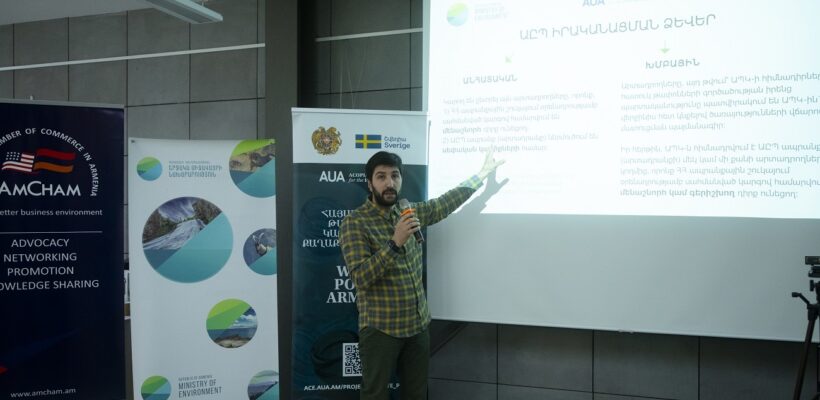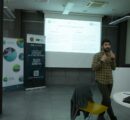
AUA Acopian Center WPA Program Continues Discussions Around EPR Legislation in Armenia
3 min readYEREVAN, Armenia — On March 26, the Sweden-funded Waste Policy Armenia (WPA) program of the American University of Armenia (AUA) Acopian Center for the Environment, together with the Republic of Armenia (RA) Ministry of Environment and American Chamber of Commerce (AmCham) in Armenia, organized an extended industry meeting to discuss the newly developed draft legislation on Extended Producer Responsibility (EPR). Representatives from a number of local businesses were present during the meeting.
The primary objective of the meeting was to encourage dialogue and engagement within the private sector regarding the forthcoming EPR regulations, set to affect businesses across Armenia. Within the scope of the WPA program, the AUA Acopian Center is supporting the RA Ministry of Environment in developing and adopting an EPR policy in the country.
Gathering insights, comments, and feedback from stakeholders during the drafting of EPR legislation is essential for shaping sustainable practices and regulatory frameworks within the business sector. AmCham Armenia, together with the RA Ministry of Environment and the AUA Acopian Center, has been actively working to engage the business community in developing EPR legislation in Armenia. Global experience demonstrates that the earlier businesses participate in the development of EPR policies, the more effective the adoption of the new legislation becomes in the country.
Prior to the meeting, the draft Law on EPR was shared with business representatives for their review. WPA Program Manager Harutyun Alpetyan addressed comments from businesses regarding the draft and facilitated a discussion related to concerns raised by the participants.
Lusine Avetisyan, head of the Strategic Policy Department at the RA Ministry of Environment, highlighted the importance of active engagement of all stakeholders during all phases of the development and introduction of EPR to ensure its effective implementation. Subsequently, AmCham Armenia President Elina Markaryan noted that together with several businesses, AmCham has been actively working on a pilot project to test the EPR system and emphasized that this initiative will offer valuable practical insights into the EPR system. Additionally, international experiences and best practices were also discussed to enhance the dialogue and offer valuable insights into effective EPR implementation strategies.
The businesses raised important questions regarding the real obligations of the relevant producers and importers of EPR goods. One of their concerns was the regulation of EPR fees to be paid by producers. Another key question was how the legislation ensures that producers engage in establishing a Producer Responsibility Organization to be the main entity coordinating the safe handling of waste generated after EPR products are consumed. The businesses highlighted that while introducing the new policy, the government should ensure that existing well-functioning mechanisms for waste handling, compliant with environmental standards, are preserved or capacitated. For instance, take-back schemes for glass bottles that already function between bottling companies and the hotel/restaurant/catering (HoReCa) sector should be maintained.
EPR is a policy tool that mandates the producers or importers of specific goods be responsible for the latter’s post-consumption waste management. This policy has been widely implemented globally since the 1990s, and Armenia, through the European Union (EU)-Armenia Comprehensive and Enhanced Partnership Agreement (often referred to by its acronym, CEPA), has committed to introducing a full-cost recovery system for several waste streams based on EPR.
WPA is a four-year program implemented by the AUA Acopian Center and funded by Sweden, aiming to achieve three main objectives: (1) to support the RA Ministry of Environment in developing and adopting an EPR system based on EU best practices; (2) to support the RA Ministry of Territorial Administration and Infrastructure in the development of a national model for source separation of solid waste and introduce it as a system in the town of Sevan and other target municipalities; and (3) to build sector capacity for scaling up the achieved program results.
The AUA Acopian Center for the Environment, a research center of the American University of Armenia (AUA), promotes the protection and restoration of the natural environment through research, education, and community outreach. The AUA Acopian Center’s focus areas include sustainable natural resource management, biodiversity protection and conservation, greening the built environment, sustainable energy, as well as information technology and the environment. Visit http://ace.aua.am.
Media Coverage
[BanksNews] Կներդրվի արտադրողի, ներմուծողի պատասխանատվության ընդլայնման համակարգ. Շրջակա միջավայրի նախարարություն
























